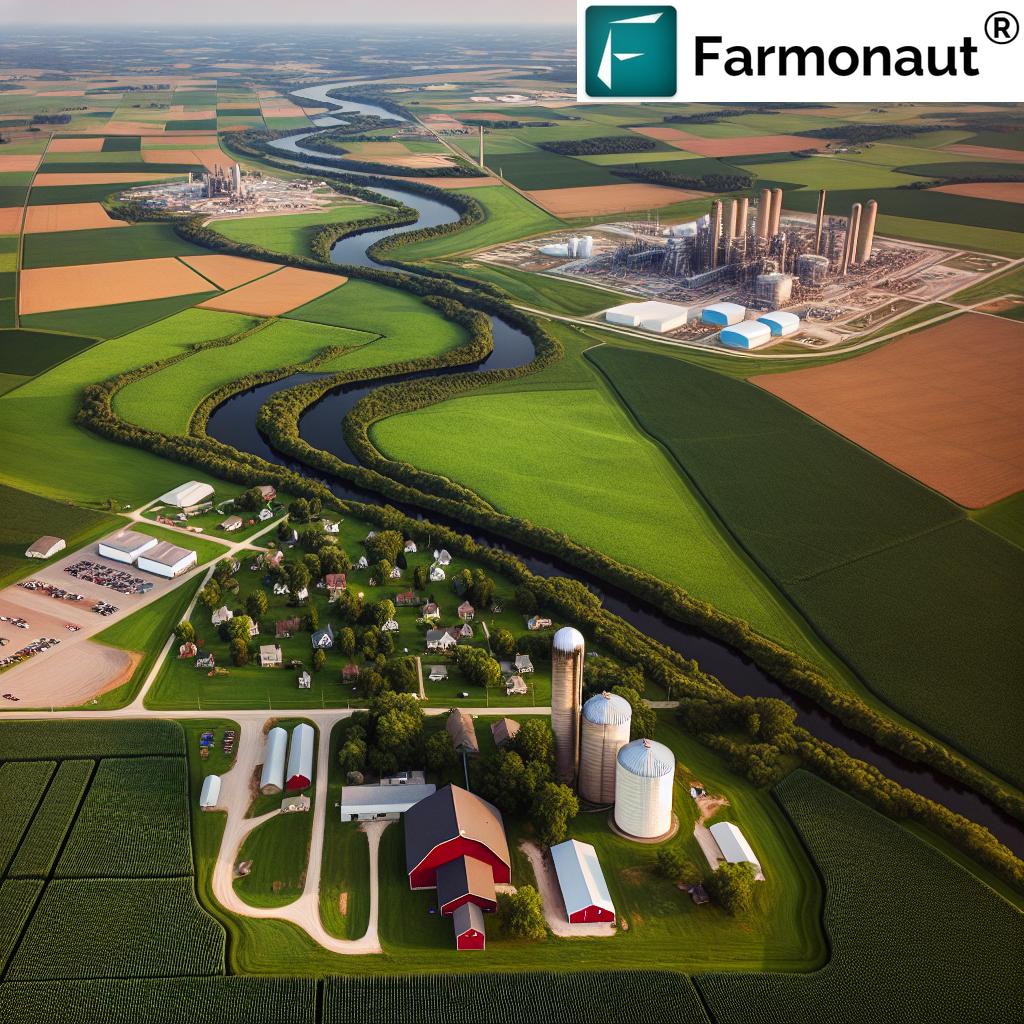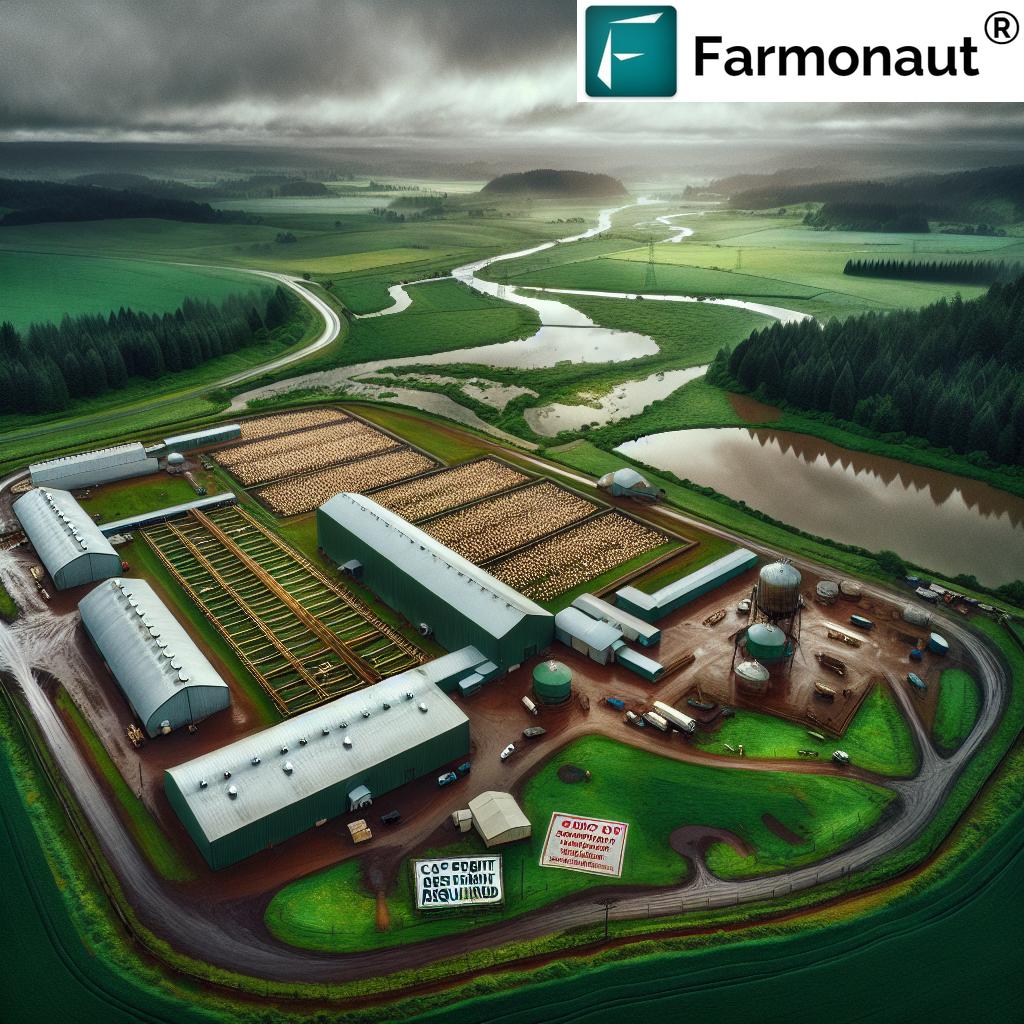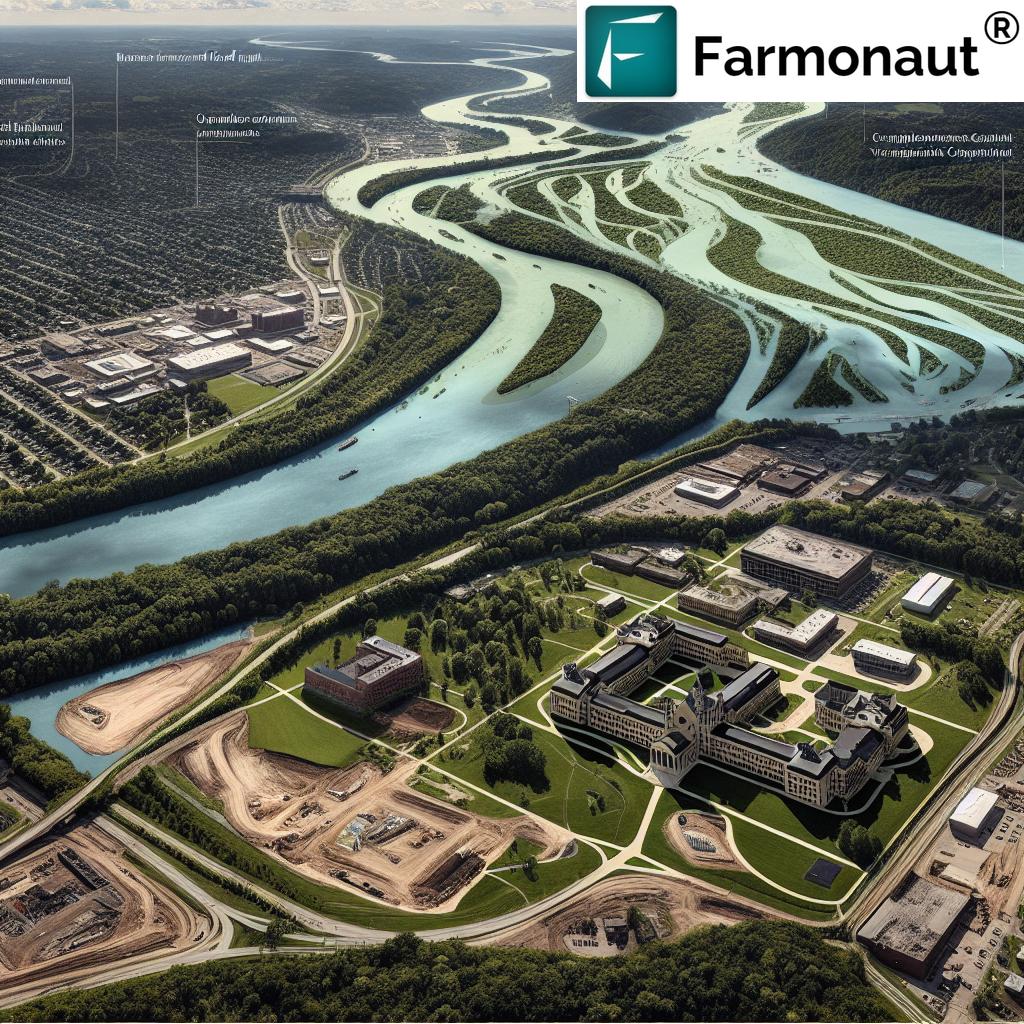Pittsylvania County’s Crossroads: Balancing Rural Farming Heritage with Industrial Rezoning and Economic Growth

“Pittsylvania County’s rezoning plan aims to convert over 760 acres from agricultural to industrial use, sparking community debate.”
In the heart of Virginia, Pittsylvania County stands at a critical juncture, facing a decision that could reshape its landscape and future. We find ourselves witnessing a stark contrast between the county’s rich rural farming heritage and the allure of industrial progress. The proposed rezoning of over 760 acres from agricultural to industrial use has ignited a fierce debate among residents, policymakers, and business interests. This controversy encapsulates the broader challenges faced by rural communities across America as they grapple with the pressures of economic development and the preservation of their agricultural roots.
As we delve into this complex issue, we’ll explore the multifaceted impacts of the proposed rezoning, examining how it could affect Pittsylvania County’s environment, economy, and community character. We’ll also consider the role of innovative agricultural technologies, such as those offered by Farmonaut, in potentially bridging the gap between tradition and progress.
The Heart of the Matter: Rezoning for Industrial Development
At the center of this controversy is a proposal by Balico LLC to rezone more than 760 acres in the Banister District from agricultural/residential to industrial use. The plan includes the construction of a natural gas power plant and several data centers in the Chatham area. This ambitious project promises significant economic investment but has raised concerns among many local residents about its impact on their way of life and the environment.
The rezoning request affects an area adjacent to over 100 property owners, many of whom have deep roots in the county’s agricultural tradition. Among these are Amy and Dave Davis, whose family farm in the Mill Creek area has been a part of the community since 1963. Their refusal to sell their 278 acres to Balico underscores the emotional and cultural significance of the land to long-time residents.
As we consider the implications of this rezoning, it’s worth noting how satellite technology, like that used by Farmonaut, could play a role in monitoring land use changes and their environmental impacts. Such tools could provide valuable data to inform decision-making processes in cases like Pittsylvania County’s rezoning debate.
The Promise of Progress: Economic Growth and Infrastructure Improvements
Proponents of the rezoning argue that the project could bring substantial economic benefits to Pittsylvania County. The proposed investment, estimated between $40-100 million, has the potential to improve local schools, create jobs, and stimulate economic growth throughout the region.
One of the most tangible benefits highlighted by supporters is the improvement of water infrastructure. The neighboring town of Hurt has partnered with Balico for a water agreement that could significantly reduce water rates for residents. Currently, Hurt buys its water from Altavista at a steep rate of $17 per thousand gallons. The proposed development includes plans for a water treatment plant in Hurt and a 19-mile water line to the power plant in Chatham, which could alleviate this burden on residents.
Gary Hodnett, Mayor of Hurt, emphasizes the potential positive impact on vulnerable residents: “Some of these older ladies that live by themselves and live on a fixed income take the little plastic washbowl, fill that up in the morning with water, and that’s their daily allowance for water.” The promise of more affordable water access is a compelling argument for those struggling with current rates.
“The proposed industrial development in Pittsylvania County includes a data center and natural gas power plant, threatening rural farming heritage.”
Environmental Concerns and Community Character
Despite the potential economic benefits, many residents express deep concerns about the environmental impact of the proposed industrial development. The conversion of agricultural land to industrial use raises questions about water resources, air quality, and the local ecosystem.
Amy Davis, a vocal opponent of the rezoning, articulates these concerns: “This is not the right area for such a project that not only will take away our beautiful land and countryside, but it will pollute our water and air.” This sentiment reflects a broader worry about the long-term consequences of industrial development in a traditionally rural area.
The preservation of Pittsylvania County’s rural character is at the heart of many residents’ opposition to the rezoning. The county’s identity as a “rural farming community” is deeply ingrained, and there’s a strong desire among many to maintain this heritage. The proposed industrial development represents a significant shift in land use that could fundamentally alter the landscape and community dynamics.

In considering these environmental concerns, it’s worth exploring how modern agricultural technologies could help mitigate some of the potential impacts. For instance, Farmonaut’s satellite-based crop health monitoring could assist farmers in optimizing their resource use, potentially reducing the strain on water resources in the area.
The Role of Infrastructure and Resource Management
The proposed industrial development’s location is closely tied to existing infrastructure, particularly the Mountain Valley Pipeline that runs through the area. This access to natural gas is a key factor in Balico’s site selection, as explained by Mayor Hodnett. The proximity to this energy source underscores the complex interplay between resource availability, industrial development, and land use planning in rural areas.
While the pipeline access presents an opportunity for industrial growth, it also raises questions about the long-term sustainability of relying on fossil fuel infrastructure. As communities worldwide grapple with the challenges of climate change, the decision to build a natural gas power plant could have far-reaching implications for Pittsylvania County’s environmental future.
In this context, it’s important to consider how advanced agricultural technologies could contribute to more sustainable resource management. For example, Farmonaut’s AI-driven advisory system could help farmers optimize their water usage and reduce overall resource consumption, potentially alleviating some of the pressures on local infrastructure.
The Decision-Making Process and Community Engagement
The rezoning issue in Pittsylvania County highlights the importance of community engagement in land-use decisions. The upcoming public hearing on March 18 represents a critical opportunity for residents to voice their opinions and concerns about the proposed development.
The Board of Supervisors faces the challenging task of weighing the potential economic benefits against the environmental and cultural costs of rezoning. Their decision will have lasting implications for the county’s future, affecting everything from job opportunities to the preservation of agricultural land.
As the community grapples with this decision, there’s a need for comprehensive information and data to inform the debate. Here, technologies like those offered by Farmonaut could play a crucial role. By providing detailed insights into land use, crop health, and resource management, such tools could help stakeholders make more informed decisions about the future of their community.
Comparative Analysis: Agricultural vs. Industrial Impact
To better understand the potential effects of the proposed rezoning, let’s examine a comparative analysis of maintaining agricultural zoning versus converting to industrial use:
| Aspect | Agricultural Zoning | Industrial Rezoning |
|---|---|---|
| Land Use (acres) | 760+ acres preserved for farming | 760+ acres converted to industrial use |
| Estimated Job Creation | Limited new jobs in agriculture sector | Potential for significant job growth in industrial sector |
| Water Resource Impact | Continued agricultural use of water resources | Increased water demand, potential for improved infrastructure |
| Air Quality Impact | Minimal change from current conditions | Potential increase in emissions from industrial activities |
| Ecosystem Effect | Maintenance of current rural ecosystem | Significant alteration of local ecosystem |
| Community Character | Preservation of rural farming heritage | Shift towards more industrialized landscape |
This comparative analysis underscores the complex trade-offs involved in the rezoning decision. While industrial development promises economic growth and improved infrastructure, it comes at the cost of significant changes to the local environment and community character.
The Role of Technology in Sustainable Rural Development
As Pittsylvania County navigates this challenging decision, it’s worth considering how modern agricultural technologies could contribute to a more sustainable future, regardless of the rezoning outcome. Farmonaut’s suite of tools, for instance, offers solutions that could benefit both agricultural and industrial development scenarios.
For farms remaining in agricultural use, Farmonaut’s satellite-based crop health monitoring and AI advisory systems could help optimize resource use, potentially increasing yields while reducing environmental impact. This could make agricultural land more productive and economically viable, strengthening the case for preserving rural farming communities.
In the event of industrial development, Farmonaut’s technologies could play a role in monitoring and mitigating environmental impacts. The company’s carbon footprinting tools, for example, could help new industrial facilities track and manage their emissions, promoting more sustainable practices.
Furthermore, Farmonaut’s blockchain-based traceability solutions could benefit both agricultural and industrial sectors by enhancing supply chain transparency and building consumer trust. This could be particularly valuable for Pittsylvania County as it seeks to balance economic growth with environmental stewardship.
Looking to the Future: Balancing Progress and Preservation
As Pittsylvania County stands at this critical crossroads, the path forward requires careful consideration of both short-term gains and long-term sustainability. The rezoning debate highlights the need for innovative solutions that can bridge the gap between economic development and environmental conservation.
While the immediate focus is on the rezoning decision, the broader challenge lies in creating a vision for rural development that honors agricultural heritage while embracing the opportunities of the future. This may involve exploring hybrid models of land use that combine traditional farming with modern, sustainable industrial practices.
Technologies like those offered by Farmonaut could play a crucial role in this balanced approach. By providing data-driven insights and tools for efficient resource management, such platforms can help communities like Pittsylvania County make more informed decisions about land use and development.
As we look to the future, it’s clear that the challenges faced by Pittsylvania County are not unique. Rural communities across the globe are grappling with similar issues of balancing tradition with progress. The outcome of this rezoning debate could serve as a valuable case study for other regions facing similar dilemmas.
Conclusion: A Community at a Crossroads
The rezoning issue in Pittsylvania County represents more than just a local land-use decision; it embodies the broader challenges faced by rural communities in an era of rapid technological and economic change. As the county weighs the potential benefits of industrial development against the preservation of its agricultural heritage, it must also consider the long-term implications for sustainability and community well-being.
While there are no easy answers, the engagement of local residents, the careful consideration of environmental impacts, and the exploration of innovative technologies all play crucial roles in charting a path forward. Whether the county ultimately decides to approve the rezoning or maintain its agricultural character, the process of debate and decision-making will undoubtedly shape Pittsylvania’s future for generations to come.
As we conclude this exploration of Pittsylvania County’s crossroads, we’re reminded of the importance of balanced, sustainable development that respects both economic needs and environmental concerns. The tools and technologies offered by companies like Farmonaut represent just one piece of the puzzle in creating a future that honors rural heritage while embracing the possibilities of progress.
FAQ Section
- Q: What is the main issue being debated in Pittsylvania County?
A: The main issue is a proposal to rezone over 760 acres of land from agricultural/residential to industrial use for a data center and natural gas power plant project. - Q: Who is proposing the rezoning and development?
A: Balico LLC is the company proposing the rezoning and development project. - Q: What are the potential benefits of the proposed development?
A: Potential benefits include economic growth, job creation, improved water infrastructure, and lower water rates for residents. - Q: What are the main concerns of those opposing the rezoning?
A: Main concerns include loss of agricultural land, potential environmental impacts on water and air quality, and changes to the rural character of the community. - Q: When is the public hearing for this rezoning request?
A: The public hearing is scheduled for March 18. - Q: How might modern agricultural technologies impact this situation?
A: Technologies like Farmonaut’s satellite-based monitoring could help optimize resource use in agriculture and potentially mitigate some environmental concerns in both agricultural and industrial scenarios. - Q: What role does the Mountain Valley Pipeline play in this development?
A: The pipeline’s presence is a key factor in the site selection for the proposed industrial development, as it provides access to natural gas for the power plant. - Q: How might this decision affect Pittsylvania County’s future?
A: The decision could significantly impact the county’s economic development, environmental sustainability, and community character for generations to come.
For those interested in exploring how agricultural technology can contribute to sustainable rural development, consider checking out Farmonaut’s innovative solutions:
Earn With Farmonaut: Affiliate Program
Earn 20% recurring commission with Farmonaut’s affiliate program by sharing your promo code and helping farmers save 10%. Onboard 10 Elite farmers monthly to earn a minimum of $148,000 annually—start now and grow your income!




















